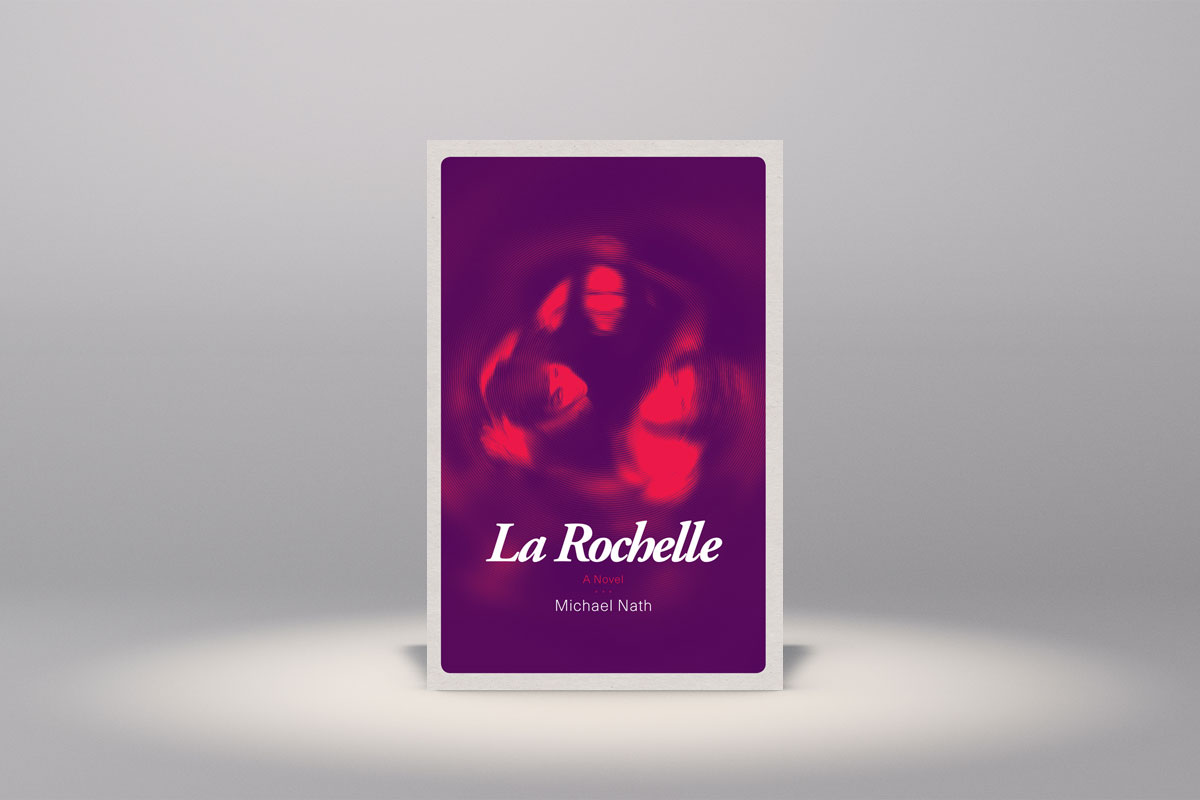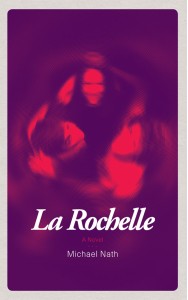In this extract from La Rochelle, Mark wakes to learn that the Princess of Wales has died. He heads out across London towards the Artillery Arms, hoping to bump into Ian and Laura.
It would have been the best part of two months after the celebration of Melania Morgan’s thirty-third birthday in the fashion we were watching last night, that I was woken early by a broadcaster calling upstairs one Sunday morning that the nation was mourning. Being a lonely bastard, I sometimes leave the TV on at night for company. You can fall into these habits. I resented being told I was mourning. I’d decide. Once I’d established what the fuck was going on here. On the stairs I slipped on my arse and banged my coccyx, which put me in just the mood.
This was nothing more than state control! State control of mind and heart. I gave them a fucking hard time, the presenters, the reporters, the Prime Minister of London. Irony, mimicry, vituperation – I blasted away with three barrels at these simpering punks. After a while, I became self-conscious about sneering bollock naked, went up for a shower, dressed, returned for seconds. By lunchtime, I was fed up with being ironic on my own: lots of my best lines were going unheard. I left the house. Where I was bound, and to what end, I did not know as I ascended the hill past the graveyard and the library.
Families and groups of families were walking to the tube with bears and flowers. All the other ironists must have stayed at home. I whistled ‘McNamara’s Band’ as I passed one group and the mother murmured, ‘He’s got no respect.’ I turned and glanced at their hot, solemn faces; they were ready to hate. A grandfather said, ‘They never have any respect.’ Bitterly I hurried on. If grandpa’d been my age, I’d have dropped him. Beneath my breath I cursed his eyes. His eyes were jellied piss. His eyes were eel-coating. The whole world was a bladder, pissing through its eyes. I was as bitter as the railers of the Jacobean stage, I had a chip on my shoulder, it was made of flint, I was Daniel de Bosola, I was a ‘deformed and scurrilous Greek’.
On the tube it was no better. Half a million of them were on their way to Kensington Gardens; each of them wanted to feel like one in half a million; each of them wanted to feel half a million strong. I reminded myself of the average attendance at the Nuremberg all-German Party rallies (1926-38): half a million. An unjust thought there and then, but it made me feel better. And indeed certain mob acts in the days following against bear-tamperers, against flower pilferers and shopkeepers who refused to shut, bore out in traces my sociology.
At Camden, the carriage crowds were giving me the horrors, so I got off and took a Northern Line tube on the other side of the V, away from the city centre. I didn’t want to be alone, I couldn’t stand crowds. What was it with me? At Chalk Farm I alighted and wandering south ‘found’ myself beside Melania’s flat.
Curiously, I retraced the route to the Artillery Arms, along which the three of them… us, had passed, and she’d asked me of holidays. Identifying roughly the spot where we’d taken the taxi into the West End later that night, I almost shouted for shame. The words, hanging in my throat, were beyond my control, as in the case of the Tourette’s sufferer. The sensation was mixed with longing. Where did the past go? Who could say? Well in the theory of the ‘block universe’, it didn’t go anywhere: we walked through time like the land we inhabited; the past vanished no more than East Finchley vanished when I come down to Chalk Farm. It did not go; it was just behind me. I suppose I hoped that theory was true, and a couple and a man were still walking down the road beside the green hill, would always be walking; for I would not see them again. My occiput was larding in the heat. What the hell I was doing there, I did not know.
Crossing Regent’s Park Road, I backtracked a little and began climbing Primrose Hill. I had a gravelly thirst. I smoked a cigarette, which aggravated it. I should have bought a can of Fanta. Better still, I should have conceded the failure of yet another Sunday, another outing, and fucked off home. Two men who looked like brothers, Italian or Anglo-Indian, and a little boy who was distinctly Indian, were flying a kite. Further up on a ridge, a pale man was peering through a large telescope on a tripod; beside him, a skinny red-faced loon in a Millwall shirt looked at me, put his finger to his lips: ‘Don’t disturb him, son! He’s calibrating.’ Could they see a bedroom, a couple mounted, a man with his dick in his hand? Heart twanging I carried on. Near the top, I was wondering if the world changed its appearance on a sunny day when you were in the first phase of a myocardial infarction, taking on the visual texture of felt, when I heard my name called. I supposed this was Death, or my heart’s valediction. My name was called again: to my left, almost concealed by parallax now I was passing a bush, was a golden head. I came back and took the bush on the left this time: there was Laura. She was sitting on a bench, Ian beside her.
Part of the magic of the old romances is that characters can bump into each other anywhere: this is the law of time-space in romance – it is never improbable that significant characters meet each other exactly here, just now, in this meadow, or strand or mountain pass. It’s still true in Don Quixote, which is meant to be teasing romances. In The Faerie Queene it is very true. Even true in modern Westerns, such as Blood Meridian. That I had to be so damn hot each time I encountered them was a personal genre difficulty.
I went forward with my head bowed in the manner of a peasant at last approaching the shrine, not wanting to look them in the face too soon, delving with the left hand in my occiput, which by now felt like a bundle of wet rushes. Planning my opening line, I managed to light a cigarette as they smiled up at me: Had they come here to avoid the hysteria?
It didn’t articulate so well: I’d have done better to choose a line with fewer aitches, after climbing Primrose Hill on my lungs.
They came every Sunday, Ian told me with a smile.
‘We come every Sunday to wait for you!’ Laura cried. ‘We thought you didn’t like us!’ There was a fineness to her voice that hadn’t been paid for at a posh school. I’d promised to meet them. She wagged her finger at me, reasonable, natural, pert. I’d promised to meet them the day after the roof party.
I was dumbfounded. Did she mean up here? She certainly did! I attempted to apologise. I felt disgraced – almost dishonoured.
‘It’s all right!’ Laura laughed benevolently. ‘You were drunk. You both were,’ she added for my sake. ‘Ian couldn’t remember either.’
‘That’s right, man!’ Ian laughed. ‘Come and join us.’ I settled between them like a plump bird. Ian patted my shoulder and rose to sit on the grass. Sprezzatura. From the beginning. We had a talk about the death of the Princess of Wales; it had upset Laura, which made me ashamed of howling at the TV in solitude this morning.
During which irony exhibition, moreover, they’d been getting ready to come and wait for me for the seventh Sunday running. Were they telling the truth? Could they mean it? I have never stopped wondering.
There and then, however, I just felt fabulously lucky. They could have trooped along to Kensington Gardens but instead they’d come to wait for me. In a state of serene cheer, disgrace overcome, not far perhaps from joy, I was sitting with my arm on the back of the bench several inches clear of Laura’s bare shoulders, which were making me think of my father’s old trick of pouring cream into coffee over a spoon reversed, when she poked me and said, ‘You didn’t ring us either!’
Cheerfully, I replied that I hadn’t had their number. On this I was corrected. She now told me that I’d made them give me it. Made produced a qualm, as if someone were at my intestines with a heavy-duty stapler. How insistent had I been?
‘You wouldn’t give us yours but you made us give you ours,’ she continued, and I was well again, as if we were infants in the yard, or teenagers sparring in flirtation. Her pertness had some range. I’d have liked to study it. I’d thought a woman who played the little girl was a transparent thing, and maybe a trashy one; yet this attitude in her was as strong, even athletic, as her shoulders.
What could have happened to their number though? As I forgot nothing, so I lost nothing. This was a mystery.
From where he was sitting on the grass, hands stretched behind him like slender buttresses, Ian asked if I had any plans. Did I fancy a drink?
We descended the hill and walked away from Chalk Farm towards Regent’s Park, taking our time. It was a great moment of my life. We had a talk about the media working everyone up, we wondered whether the media could ever be sincere. Laura thought so, I didn’t. Outside the Black Star in Camden, we stood and drank on the hot yellow-spotted pavement. They would not go till I wanted to. There had to be more than pity to this, hadn’t there? I’d had people liking me before, of course, but this was almost preposterous; or would have been if it weren’t so natural. We talked and talked, the three of us. This was the time I heard about Señor Norbert and her flight from France. When Ian went inside, she told me that stuff about Eramos amigos nada más. They had some sort of private joke about a woman Laura called her aunt; I let them keep it private.
A few days later, it came to me that I must have put their number in the pocket of the shirt I threw away. They’d given it me again, however, and this time I’d given them mine. That was August 31st 1997.

